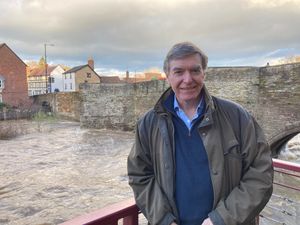Ludlow MP delighted as part of clean rivers bill set to progress
A Shropshire MP battling to clean up Britain's rivers today welcomed Government moves to take on board elements of his proposed programme of law changes.

Ludlow MP Philip Dunne has been trying to introduce wide-ranging new legislation to clean up the country's water courses through his Sewage (Inland Waters) Bill. The bill has already secured the support of several national agencies, more than 100 MPs, and a petition signed by over 50,000 people.
But restrictions on business at the House of Commons due to Covid pandemic have caused the reading of his Bill to be postponed five times, leading to fears it may get left on the shelf.
Yesterday, however, the government confirmed it would make improving the water quality of UK rivers 'an absolute priority'.
Mr Dunne explained that he had been hoping to work with the Government before Christmas but pressing legislation over the impending Brexit deal had taken priority.
"They did not have the capacity to address issues in the Bill up till Christmas," he said.
Now however, a taskforce will begin setting objectives for water companies to make them publish water quality test results in a transparent way and also begin the process of investing in drain infrastructure improvements.
In addition the Environment Secretary has given a commitment to make annual reports to Parliament on the issue of water quality.
The new objective of preventing pollution from storm overflows was agreed yesterday by the Storm Overflows Taskforce – a joint industry-government group established last year to tackle river pollution and made up of representatives from Defra, the Environment Agency, Ofwat, the Consumer Council for Water, Blueprint for Water and Water UK.
Storm overflows were designed to be used during extreme weather to prevent sewers becoming overloaded with a combination of sewage and rainwater, releasing diluted wastewater into rivers rather than letting it back up into people’s homes.
However climate change has led to increased rainfall and water infrastructure has not kept pace with development growth over decades.
Water companies have now agreed to make real-time data on sewage discharges available at bathing sites all year round, meaning surfers, swimmers and other water users can check the latest information – especially after heavy rainfall. Water companies will also accelerate work to install monitoring devices to create a complete picture of their activity by 2023.
In addition, the Taskforce has agreed with water companies that they will publish annual monitoring data on their websites about their use of storm overflows so that progress in reducing their use can be tracked. The Environment Agency will compile this data into an annual report that is easily accessible to the public.
The Taskforce update came as the Government signalled it would work with Mr Dunne on shared ambitions to tackle sewage pollution in our rivers.
Mr Dunne said: “I have been shocked to discover the extent of sewage routinely spilled in our rivers. Poor water quality has a very damaging impact on aquatic species which depend on clean rivers, and risks healthy enjoyment of our rivers by the public.
“I am really pleased this Government has recognised that this has got to change. I am delighted the Minister has responded so quickly to Covid restrictions interrupting progress of my Private Members Bill by agreeing to work with me to develop measures to improve water quality across England.”
The Storm Overflows Taskforce was set up in August 2020 to bring together water companies, regulators and environmental NGOs to accelerate progress in this area, building on work already underway to improve our rivers and waterways.
Its work covers a series of short, medium and long-term actions focused on the goal to eliminate harm from storm overflows – a generational endeavour that will involve significant change and take time to achieve.
Environment Minister Rebecca Pow said: “Making sure we have clean rivers is an absolute priority and I have been clear that I want to cut down on the water sector’s reliance on storm overflows. The Storm Overflows Taskforce, established last year, is working urgently on options to tackle this issue, which demonstrates a collective commitment for change in this critical area.
“Our ambitious Environment Bill already sets out how we will tackle various sources of water pollution. I look forward to working with Philip Dunne and others on how we can accelerate progress in this area.”
The Environment Bill will place a statutory requirement on water companies to produce drainage and sewerage management plans to help deliver more of the actions needed to address the risks sewerage assets may pose to the environment. It is the responsibility of water companies to ensure serious water pollution incidents do not occur, and they have committed to a significant programme of improvements to the monitoring and management of storm overflows over the next five years at a cost of around £1.1 billion.
As a result of the work of the Taskforce, water companies have identified opportunities to increase the number of overflows they will improve over the next five years. Work will continue to consider how the guidance given by the Secretary of State to the regulator Ofwat can best reflect the importance of water quality in water companies’ activities.
Emma Howard Boyd, chair of the Environment Agency, said: “Publishing easily accessible data is an important step to reversing the overuse of storm overflows, but disclosure is only ever the beginning. People want to see progress.
“Water quality in England’s 240,631 kilometres of river is everyone’s responsibility but water companies have a pivotal role in helping the whole country make the necessary big changes. We look forward to working with them, as well as government and MPs, to turn today’s ambition into action.”
John Russell, senior director at Ofwat said: “The work of the Storm Overflows Taskforce will play a crucial role in protecting precious parts of our ecosystem. We are committed to working with Government, regulators and the water industry to meet this challenge and ensure that we leave our rivers in a healthier condition for current and future generations.”
Christine McGourty, Water UK Chief Executive, said: “Water companies are passionate about protecting and enhancing our nation’s rivers and over the next five years are investing £1.1bn in improving storm overflows as part of our £5bn environment programme.
“The new measures agreed by the Storm Overflows Taskforce are an important step forward in tackling this key issue. And we look forward to continuing the close collaboration with Government and other partners to help enhance the health of rivers even further, for the benefit of our customers, communities and the environment.”
Mr Dunne stressed that his original Bill was still on the table and he looked forward to bringing it back to the House.
"The aim is to clear up our rivers and we are very much at the beginning of the journey," he said.





